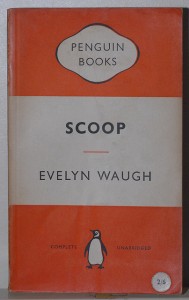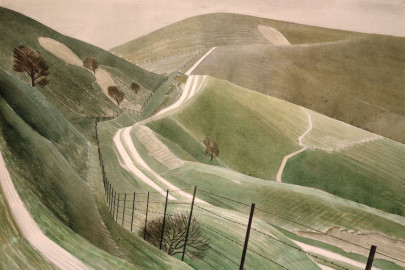As the Leveson Inquiry trundles interminably on, guest poster Michael Noble (aka @Contact_Light) revisits Evelyn Waugh’s classic novel about hack behaviour…
One of the favoured resorts of tabloidese is the word ‘tragic’, easily inserted into a pithy headline, or appended as an adjective. It would be all too tempting also to apply it to some of the sleaziest episodes emerging from the ongoing autopsy into the Hacking Scandal. The appalling treatment of the Dowler family notwithstanding, a better label would be ‘comic’. A comedy of the blackest sort, but a comedy nonetheless.
The sorry saga’s biggest comic find has been the Amisesque character of Paul McMullan [above]. A preternaturally seedy, crumpled figure, he has inhabited the role of jester, at times playing up to the audience, but with the more essential duty of saying the unsayable. While many in the newspaper industry would seek to distance themselves from some of journalism’s dodgier practices, the unguarded utterances of McMullan harked back to an earlier age of the craft, when worrying about one’s brand meant being concerned over the supply of cigarettes.
So it was with this in mind that I paid a revisit to Scoop, Evelyn Waugh’s pre-war ‘novel about journalists’ available here for a penny. It is, appropriately, a comedy; an innocent abroad tale in which a farcical case of mistaken identity results in greenhorn William Boot being sent to Ishmaelia, a small African country beset by civil war. Along the way, he learns much about the cosy world of journalism and its perks and peculiarities. The device allows Waugh his broadest comic strokes. The scenes in which the bumpkin Boot is fitted out with the equipment for his trip fall back upon the comic interplay between naïf and expert, or, funny guy and straight man.
It is more than that, however. The scene is only sustained because no character is able to pierce the absurdity, everyone is too afraid of being seen naked the one to point out that they are all starkers. In this we get a flavour of the groupthink that sustained such obvious malfeasance in the newspaper industry for so long. Everyone was doing too well out of the situation to even notice how far they had come. The sign saying ‘LAST EXIT: MORAL CERTAINTY, had long since been passed; no one had his eyes on the road.
Waugh’s pen had a subtler tip too. His mordant wit is the perfect vehicle for delivering criticisms of the systemic problems inherent in journalism. He floats with ease between broad farce and subtle snide commentary, and very carefully blends the two to startling effect. He sketches the shadier practices of hack work beautifully. The shared experience of doorstepping grieving families and the enjoyment of elastic expense accounts are as familiar to these 1930s journalists as they are to those currently undergoing public examination.
Adding a further layer of bitter humour to the novel is the quietly repeated insistence that The Daily Beast, and in actuality, its proprietor Lord Copper, has its own ‘policy for the war’, a preferred outcome best suited to entertain its readers (and sell newspapers). The Bond villain-esque notion that a media organisation would seek to prosecute world events to its own ends is at once natural and offensive. It was, however, accepted with a weary lack of surprise when leaks revealed that News International had sought to direct at least part of the policy on the 2003 invasion of Iraq. Against this backdrop, the Beast’s interference in Ishmaelite affairs seems positively quaint.
Waugh’s journalists treat it much like a game. A sport of perpetual one-upmanship, in which a ‘scoop’ is regarded not with admiration, but with bitter jealousy and accusations of cheating. There are rules though. Once a scoop is made, it stays made, even once it has been found to be false. These guys may be competitors, but it wouldn’t pay to let on just how slippery their grasp on events really is. Even at seventy years remove, it sheds some light on the desperate defence of Johann Hari by some of his industry fellows.
Contact between Ishmaelia and London is by means of telegram, which is a superb device for modern eyes, resembling in its abbreviation and elision, the deceptively oblique Newspeak of the tabloid headline. Boot, the neophyte, lacks the ease and brevity of his more experienced hack companion, Corker, who can read a dictionary of subtleties in the obscure cables from headquarters. There are several orders of language here, the plain banalities of the obvious superimposed on the deeper truths read by the initiated. With their deceitful messaging they resemble Cold War spies, albeit with slightly larger bar tabs.
Of course, the naïve Boot has no understanding of this, or indeed of what constitutes a scoop. He makes his winning despatch as a half-hearted throw of the dice, sending it simply because he has already gone to the trouble of writing it, not because he cares. In fact, the only character who does seem to care at all is the enigmatic Mr Baldwin, who tells our hero:
I read the newspapers with lively interest. It is seldom that they are absolutely, point-blank wrong. That is the popular belief, but those who are in the know can usually discern an embryo truth, a little grit of fact, like the core of a pearl, round which have been deposited the delicate layers of ornament.
Those layers are no longer delicate, and it would take a generous heart to describe them as ornamental. In his testimony to Leveson, renegade Daily Star hack Richie Peppiatt ran through some of the headlines he had made up out of whole cloth. My favourite, BUBBLES TO GIVE EVIDENCE AT JACKO TRIAL had no hope, or intention of being believed. There is no need for it to do so. As McMullan said in one of his moments of unintentioned perspicacity, ‘circulation defines what is the public interest’. In other words, newspapers peddle bullshit because people pay money to read bullshit. If there is a conspiracy at the heart of British journalism, then we, the buying public, are as guilty as anyone else of sustaining it.
For absurdity to work, we all need to suspend our disbelief. There is no chance of improvement in the culture of journalism, nobody wants to admit what they are really seeing. This takes a degree of naïveté that nobody wants to admit to possessing. We are all too knowing, too clever, too much like the bloke in the pub who says ‘ah, it’s all made up anyway’, but still buys his copy every day. Even William Boot, Scoop’s definitive naïf returns to his dilapidated Devon pile, empty of any desire to put journalism right. That desire is just as lacking today.













Welcome Mike! A very good review of a very good book. I’d never considered it before but your review has revealed to me a moral/thematic parallel between Scoop and Catch 22 – as you say “no character is able to pierce the absurdity, everyone is too afraid of being seen naked, the one to point out that they are all starkers. In this we get a flavour of the groupthink…The sign saying ‘LAST EXIT: MORAL CERTAINTY, had long since been passed; no one had his eyes on the road.”
Interesting analogies, Mike. And Fred Goodwin and the other tyrannical bumblers were surely thrown from the Lord Copper mould?
Up to a point, Gaw
Feather-footed through the plashy fen passes the questing vole.
Paul McMullan really is Amisesque, isn’t he? Except Martin would of course have called him Keith McMullan.
I’ve read and greatly enjoyed Waugh’s complete works but find that for me they’re either strangely unmemorable (the early ones, the characters of which I get confused) or utterly indelible (Handful of Dust, Pinfold).
I came for Malty’s comments, and stayed for the book recommendations.
Scoop for 1p in dead tree form, one pound ninety as a bucket ‘o bits.